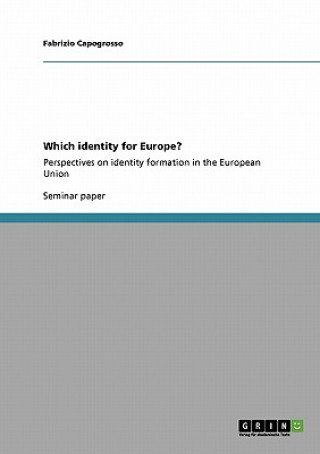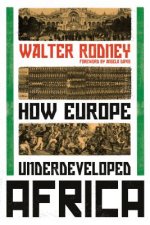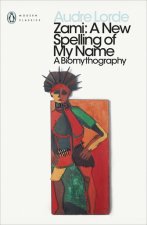
Kód: 01617977
Which identity for Europe?
Autor Fabrizio Capogrosso
Seminar paper from the year 2008 in the subject Sociology - Political Sociology, Majorities, Minorities, printed single-sided, grade: 1,0, European University Viadrina Frankfurt (Oder), 46 entries in the bibliography, language: En ... celý popis
- Jazyk:
 Angličtina
Angličtina - Vazba: Brožovaná
- Počet stran: 64
Nakladatelství: Grin Publishing, 2009
- Více informací o knize

Mohlo by se vám také líbit
-

Tours Symposium on Nuclear Physics IV: Tours 2000
5264 Kč -

Amours of Zeokinizul, King of the Kofirans Translated from the Arabic of the Famous Traveller Krinelbol
516 Kč -

Especializacion del traductor en el comercio exterior
2658 Kč -

Hebraistik - Hermeneutik - Homiletik
7409 Kč -

Der TV-Gucki oder über den richtigen Umgang mit Fernsehen und Computerspielen, m. Holzfigur
278 Kč -

Forschungsreise S.M.S. Gazelle in Den Jahren 1874 Bis 1876
1757 Kč
Darujte tuto knihu ještě dnes
- Objednejte knihu a zvolte Zaslat jako dárek.
- Obratem obdržíte darovací poukaz na knihu, který můžete ihned předat obdarovanému.
- Knihu zašleme na adresu obdarovaného, o nic se nestaráte.
Více informací o knize Which identity for Europe?
Nákupem získáte 108 bodů
 Anotace knihy
Anotace knihy
Seminar paper from the year 2008 in the subject Sociology - Political Sociology, Majorities, Minorities, printed single-sided, grade: 1,0, European University Viadrina Frankfurt (Oder), 46 entries in the bibliography, language: English, abstract: In the last decades, debates about the existence and the meaning of an European idetity raised all the time more. Some scholars approached the theme, focussing on a common historical heritage , which points to a basis for a collective identity (Habermas 2001; Giesen 2003), others based their arguments on political and institutional similarities among European countries like human rights protection, democracy and rule of law (Risse 2001). In other cases, the studies on the topic focussed on the ambivalent employ of the term identity , arguing its (ab)-use, above all in EU-Treaties, instead of more obviously expressions as legitimacy or sovereignty (Bruha/ Rau 2000).The aim of this paper is to examine the topic from two distinctive perspectives: a post-national and a postmodern. The paper suggests a sort of back to the roots of the en-quiry, approaching the subject neither with pre-existent assumptions nor with the goal to order puzzled arguments. The study will not pursue the question about the existence of a collective European identity, but will search for possible ways and circumstances, in which identity in Europe (restricting the focus on the European Union) may emerge.The central question of the paper will be if the development of an European identity is plausible and if a widespread process of socialisation may prevail on the national structures of the member states (hereafter MSs) and lead to the growth of common procedures and functions among European populations. In order to answer the question the more satisfactory as possible, the dissertation proposes two differing angles for the analysis with the intend to compare the findings resulting from dissimilar criteria of examination.In a first part the EU will be considered as a post-national political order, deriving from the dissolution of its MSs. After a short explanation on the political nature of the Union from this standpoint, the dissertation will explore the option of an emerging post-national identity in the European Union, adopting the criteria proposed by Anthony Smith in his study of national identities (Smith 1991). The analysis will evaluate if the EU attends the proposed criteria in order to assess the coming out of a post-national form of social identification. [...]
 Parametry knihy
Parametry knihy
Zařazení knihy Knihy v angličtině Society & social sciences Society & culture: general Social groups
1084 Kč
- Plný název: Which identity for Europe?
- Podnázev: Perspectives on identity formation in the European Union
- Autor: Fabrizio Capogrosso
- Jazyk:
 Angličtina
Angličtina - Vazba: Brožovaná
- Počet stran: 64
- EAN: 9783640262397
- ISBN: 3640262395
- ID: 01617977
- Nakladatelství: Grin Publishing
- Hmotnost: 95 g
- Rozměry: 210 × 148 × 4 mm
- Datum vydání: 11. February 2009
Oblíbené z jiného soudku
-

Women Who Run with the Wolves
238 Kč -

Freedom Writers Diary
287 Kč -

Think Like a Monk
441 Kč -

Orientalism
306 Kč -

How Europe Underdeveloped Africa
515 Kč -

Desert Flower
286 Kč -

Why Does He Do That?
427 Kč -

Letters to a Young Muslim
303 Kč -

Eros and Mysteries of Love
426 Kč -

Life After Darkness
520 Kč -

Puer Tea
937 Kč -

Womanhood
544 Kč -

Complete Book of Pilates for Men
447 Kč -

JFK - 9/11
740 Kč -

Sword of No-sword
646 Kč -

Servitors of Empire
478 Kč -

Gypsy Identities 1500-2000
1641 Kč -

Colloquial Yiddish
1682 Kč -

Gerotranscendence
3473 Kč -

Northwest Coast Indian Art
721 Kč -

Qur'an
810 Kč -

When God Was A Woman
496 Kč -

The Mastery of Love
309 Kč -

Vintage Menswear
435 Kč -

Who Cooked the Last Supper?
427 Kč -

Women Who Run With The Wolves
410 Kč -

The Way of Men
334 Kč -

The Autobiography of Malcolm X
225 Kč -

Second Sex
410 Kč -

Goddesses in Everywoman
303 Kč -

Talking with Female Serial Killers - A chilling study of the most evil women in the world
276 Kč -

Intellectuals and Society
538 Kč -

Women in the Qur'an
493 Kč -

Erotic Bondage Book
367 Kč -

Zami
286 Kč -

Nine Years among the Indians, 1870-1879
618 Kč -

Dark Emu
410 Kč -

Childhood and Society
394 Kč -

Happy City
303 Kč -

The Male Nude
481 Kč -

The Bell Curve
464 Kč -

We Should All Be Feminists
213 Kč -

Empire of the Summer Moon
357 Kč -

Radium Girls
276 Kč -

Dance of Anger
276 Kč -

Beauty Myth
357 Kč -

Muqaddimah
543 Kč -

TROUBLEMAKER
363 Kč -

Ladies' Book of Etiquette and Manual of Politeness
306 Kč
Osobní odběr Praha, Brno a 12903 dalších
Copyright ©2008-24 nejlevnejsi-knihy.cz Všechna práva vyhrazenaSoukromíCookies



 Vrácení do měsíce
Vrácení do měsíce 571 999 099 (8-15.30h)
571 999 099 (8-15.30h)